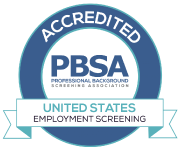Voir ce qui est tendance dans l’industrie des vérifications des antécédents
Why Fingerprinting is a Crucial Step for Key Industries When Hiring
 In the ever-evolving world of background checks and employee screening, fingerprinting has emerged as a crucial component, especially in industries where security and trust are paramount. While this practice is mostly but not exclusively in the United States, its importance is recognized globally, particularly in sectors like healthcare, banking, and finance.
In the ever-evolving world of background checks and employee screening, fingerprinting has emerged as a crucial component, especially in industries where security and trust are paramount. While this practice is mostly but not exclusively in the United States, its importance is recognized globally, particularly in sectors like healthcare, banking, and finance.
How Fingerprinting Goes Beyond Basic Identity Verification
Fingerprinting goes beyond the standard identity verification process. It involves checking an individual's fingerprints against a database to ensure there are no criminal records or undisclosed activities that might make them unsuitable for certain job roles. This level of scrutiny is essential in sectors where employees have access to sensitive information, financial assets, or vulnerable populations. These include the healthcare, banking, and finance sectors in particular.
A Case for Stringent Screening in the Healthcare Sector
In healthcare, the stakes are exceptionally high. Healthcare professionals not only have access to sensitive patient data but also to vulnerable individuals and medications. Fingerprinting ensures that those entrusted with patient care do not have a history of criminal activity that could endanger patient safety or privacy. It is a tool to maintain the integrity and trust critical to the healthcare system.
 Ensuring Security and Trust in Banking and Finance
Ensuring Security and Trust in Banking and Finance
Similarly, in the banking and finance sectors, where employees handle significant financial transactions and sensitive personal data, fingerprinting is an indispensable tool. It helps in mitigating risks associated with fraud, embezzlement, and identity theft. By ensuring that employees in these sectors are thoroughly vetted, organizations can protect their reputations and maintain customer trust.
Fingerprinting in the Hiring Process
Incorporating fingerprinting into the hiring process can be an intricate task. It requires understanding the legal implications, obtaining the necessary consent, and ensuring that the process is carried out in a way that respects the candidate's privacy and rights. Employers must also be aware of the regulations governing the use of fingerprinting in their country, state, or jurisdiction.
Fingerprinting Across the Globe
While fingerprinting is a common practice in the US, especially in public sector jobs or roles requiring security clearance, its usage varies globally. In some countries, fingerprinting for employment purposes is heavily regulated or even prohibited. Employers operating in multiple jurisdictions need to navigate these differences carefully.
 How ISB Global Services Streamlines Fingerprinting in Background Checks
How ISB Global Services Streamlines Fingerprinting in Background Checks
As a provider of comprehensive background check services, ISB Global Services understands the complexities of incorporating fingerprinting into background checks and hiring processes. ISB offers solutions that streamline this aspect of employee vetting, ensuring that it is done efficiently and in compliance with all local legislation.
ISB provides expertise in handling sensitive data, ensuring compliance with legal standards, and offering a seamless process for both employers and candidates. This expertise is particularly valuable for organizations in industries like healthcare, banking, and finance, where the stakes of proper employee vetting are high.
Fingerprinting is a vital tool in the background check process for certain industries, offering an added layer of security and trust. As the practice continues to evolve globally, the services provided by ISB are essential for organizations seeking to implement thorough, compliant, and efficient background check processes.



